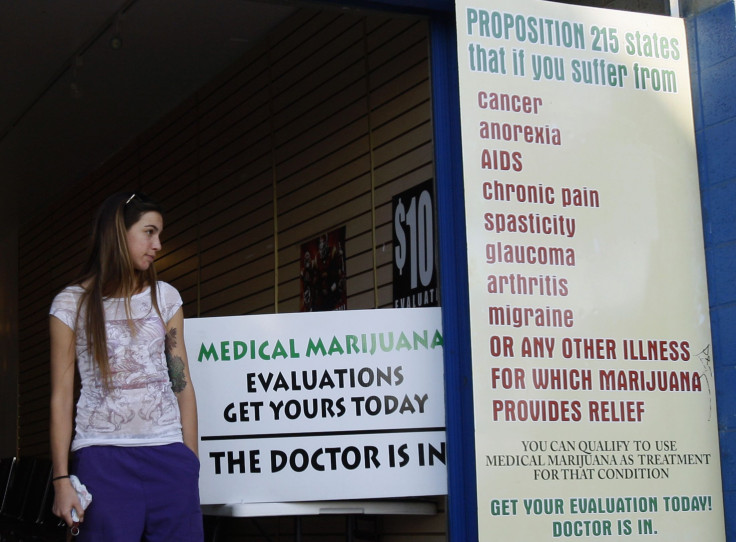Medical Marijuana For Children: Advocates Ambivalent About Pediatrics Group's New Policy On Drugs For Kids

October was magical for 13-year-old Branden Petro. After having near-constant epileptic seizures for five years, he traveled with his mother from Florida to California to undergo drug trials. The three weeks they were there, he was seizure-free, they say.
But it wasn't magic that helped Branden. It was marijuana, his mother said. There's no hard evidence medical marijuana can aid kids, but Renee Petro said she already had proof that it helped her son. When doctors gave Branden cannabis in California, she said he improved "almost instantaneously."
Across the nation, debate is growing over whether sick children should be treated with medical marijuana. The American Academy of Pediatrics weighed in Monday by slightly updating its long opposition to legalizing marijuana for medical or recreational use. It said medical marijuana should only be prescribed "for children with life-limiting or severely debilitating conditions and for whom current therapies are inadequate."
Medical marijuana advocates said the policy shift was progressive, but weak. They said the organization's recommendations that the government reschedule marijuana as a lesser drug and allow more research were valid, but unlikely to happen anytime soon. "I'm clapping my hands but still rolling my eyes," Renee Petro said.
California is one of 23 states that have legalized medical marijuana, along with Colorado, Maine, New York and Washington. Eleven others, including Alabama, North Carolina and Utah, have passed laws allowing its limited use. In December, President Barack Obama ended the federal government's prohibition on medical marijuana when he signed Congress' year-end spending bill into law.
In addition to epilepsy, patients with conditions like Crohn's disease, cancer, fibromyalgia and glaucoma have reported feeling better on the drug, according to the New York Times, but using cannabis on kids has long been a controversial issue. Washington, D.C.-based group Parents Opposed to Pot cites the unknown effects of marijuana on young brains still developing until age 25.
"We do not oppose treating childhood epilepsy with a marijuana derivative, but wish for safe implementation, with sound medical input," the group's mission statement says, adding, "We don’t condone the way marijuana is being forced into the mainstream, and we’re alarmed about what it does to children."
For the American Academy of Pediatrics and other organizations, the answer is more research. But Paul Armentano, the deputy director of the National Organization for the Reform of Marijuana Laws in Washington, said the government is blocking the right kind of research from happening.
"Any research protocol to study marijuana has to be approved by various federal agencies, because ultimately they are going to decide whether or not they get to do the study," he said. "Since the federal government has a bias against studying marijuana as a potential therapeutic agent … [it] isn't particularly interested."
Evidence of this bias lies in marijuana's classification as a Schedule I drug, Armentano said. Schedule I drugs have "no currently accepted medical use and a high potential for abuse," according to the U.S. Drug Enforcement Administration's website, and include heroin, ecstasy and LSD. Cocaine, methadone and oxycodone fall into Schedule II, where some activists want marijuana moved.
If marijuana were a Schedule II substance, restrictions on the kinds of research needed to bring it to a wider audience -- for example, long-term studies or double-blind clinical trials -- would be looser and more likely to attract support. "Because it remains in Schedule I, it's literally impossible to fund or provide that final stage of research," Armentano said.
The Realm of Caring in Colorado Springs, Colorado, wants the rescheduling to go even further. The nonprofit's medical consultant, psychiatric nurse practitioner Cristi Bundukamara, said it’s pushing for the marijuana chemical cannabidiol (CBD) to be declassified entirely.
CBD is what patients' parents are usually referring to when they talk about marijuana treatments for kids. It differs from the well-known marijuana compound tetrahydrocannabinol (THC) in that it's nonpsychoactive -- CBD doesn't get people high, Bundukamara said.
Charlotte’s Web, a strain of medical marijuana high in CBD and low in THC, made headlines last year when Florida Gov. Rick Scott signed a law legalizing it. Charlotte’s Web was named after 8-year-old Charlotte Figi, who as a result of taking an oil extracted from it went from having 300 seizures a week to three a month. Colorado classifies Charlotte’s Web oil as a hemp-derived food product, and sellers have a waiting list of 12,000 people, the Associated Press reported.
Charlotte’s mom, Paige Figi, said Realm of Caring’s political sponsors plan to reintroduce a federal Charlotte’s Web bill in Congress in the next two weeks. H.R. 5226, a previous version of the bill introduced by Rep. Scott Perry, R-Penn., died last year. The Charlotte’s Web Medical Hemp Act would take industrial hemp and CBD out of the definition of marijuana, freeing them from any sort of drug-listing schedule and allowing more growers to produce more oil.
Figi said CBD is no more dangerous than hemp seed granola. “People are just politically afraid of anything that’s cannabis- or hemp-related,” she said. “I don’t think it deserves a Schedule II. It deserves a good, scientific approach.”
Figi said she was happy with the American Academy of Pediatrics’ new medical marijuana policy because it applies some pressure on the government to legalize medical marijuana for children. But it’s not the first major organization to call for the drug’s rescheduling. The American Nurses Association, American Patients Rights Association and American College of Physicians have all publicly supported dropping marijuana to a lower level to expand research opportunities. Because of this, Armentano said he’s not optimistic anything will change with the new pediatricians’ policy.
“The federal government has, for over 40 years, resisted each and every call to reschedule cannabis,” he said. “If the past is to serve as a precedent, this call will fall upon deaf ears.”
© Copyright IBTimes 2024. All rights reserved.






















